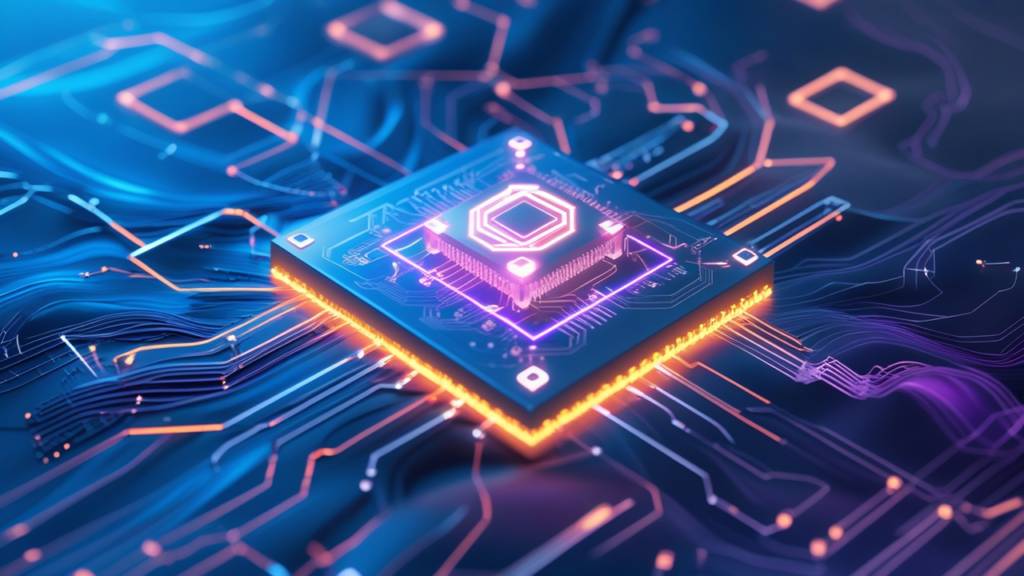Introduction
Have you ever wondered what the future of technology looks like? One big part of that future is quantum computing. You might have heard this term in the news or seen it in movies, but what does it really mean? Don’t worry, this guide will explain quantum computing in simple English so anyone can understand it.
By the end of this article, you’ll know what a quantum computer is, how it’s different from normal computers, and why it could change the world.
What is a Quantum Computer?
To understand quantum computers, we first need to understand how normal computers work.
A regular computer, like the one you’re using now, works with bits. A bit is the smallest piece of information. It can be a 0 or a 1. Everything you see on your screen—videos, games, apps—is made using combinations of 0s and 1s.
A quantum computer uses something called qubits instead of bits.
What is a Qubit?
A qubit is special. Unlike a bit, which can only be a 0 or a 1, a qubit can be both at the same time. This is because of a strange rule in quantum physics called superposition.
Imagine flipping a coin. When it’s in the air, it’s kind of both heads and tails until it lands. That’s a bit like how qubits work.
Key Concepts in Quantum Computing
Let’s explore the two main ideas that make quantum computers powerful:
1. Superposition
As we just mentioned, superposition means a qubit can be in more than one state at once. This allows quantum computers to process many possibilities at the same time.
Example: A regular computer checks each possible password one by one. A quantum computer can check many at the same time!
2. Entanglement
Another cool concept is entanglement. When two qubits are entangled, changing one qubit affects the other instantly—even if they are far apart. This helps quantum computers work much faster and better on complex problems.
How Do Quantum Computers Work?
Quantum computers use quantum bits (qubits) made from particles like electrons or photons. These particles follow the rules of quantum mechanics, which are different from the rules we see in everyday life.
To control qubits, scientists use very advanced machines. These machines need to keep the qubits cold—colder than outer space! This helps the qubits stay stable and not lose their information.
Quantum computers are not good at everything. They are best used for special kinds of problems like:
- Simulating molecules for drug research
- Optimizing large systems (like airline routes or delivery trucks)
- Breaking complex encryption (which keeps your data safe)
Quantum Computers vs. Classical Computers
| Feature | Classical Computer | Quantum Computer |
| Basic Unit | Bit (0 or 1) | Qubit (0 and 1 at once) |
| Speed | Fast for basic tasks | Very fast for complex tasks |
| Best For | Emails, games, websites | Chemistry, AI, cryptography |
| Energy Use | Can use a lot of power | Needs cold environment |
Why is Quantum Computing Important?
Quantum computers could solve problems that regular computers might take millions of years to finish.
Here are some areas where they can make a big difference:
1. Healthcare and Medicine
Quantum computers can simulate how molecules interact. This helps scientists find new medicines faster and more safely. It could help in the fight against cancer, Alzheimer’s, and even future viruses.
2. Artificial Intelligence (AI)
AI needs a lot of data and computing power. Quantum computing can help speed up learning and make AI smarter. This can lead to better robots, smarter virtual assistants, and self-driving cars.
3. Cybersecurity
Today’s internet uses encryption to keep information safe. Quantum computers can crack current encryption methods quickly. But don’t worry—quantum encryption (called quantum cryptography) is also being developed to protect data in the future.
4. Climate and Environment
Quantum computers can help simulate the Earth’s climate more accurately. This can lead to better predictions, smarter energy use, and solutions to global warming.
Challenges of Quantum Computing
Even though it sounds amazing, there are still some big challenges.
- Qubits are delicate. Even the smallest vibrations or heat can cause errors.
- Very expensive to build. Quantum machines need special labs and tools.
- Still in early stages. We don’t have many working quantum computers yet.
But many companies are working hard to fix these problems. Some big names include:
- IBM
- Microsoft
- Intel
- D-Wave
Quantum Supremacy: What Does It Mean?
You might hear the term quantum supremacy. This means a quantum computer did something no classical computer could do in a reasonable amount of time.
In 2019, Google said their quantum computer did a task in 200 seconds that would take the world’s fastest supercomputer 10,000 years. That’s a huge leap!
When Will Quantum Computers Be Available to Everyone?
Right now, quantum computers are mostly used by scientists and researchers. But just like how big computers in the 1950s became laptops and smartphones, quantum computers could one day become common.
Some companies even offer cloud-based quantum computing, where you can test small programs online.
Learning More About Quantum Computing
If you’re interested in learning more, here are some simple steps:
- Watch beginner videos on YouTube – Look for “quantum computing for beginners.”
- Read blogs or news articles – Websites like IBM and MIT post updates in simple language.
- Take online courses – Platforms like Coursera or edX offer beginner-friendly courses.
Conclusion: The Future of Supercomputers
Quantum computing is not just science fiction. It’s a real technology that could change the world. From medicine to space travel, from solving traffic jams to designing new materials, the power of quantum computers is endless.
Even though there are challenges today, experts believe the future of supercomputers will be quantum. It’s only a matter of time before these powerful machines become part of our everyday lives.
So the next time you hear the words “quantum computer”, you’ll know it means a machine that can think in many directions at once—a true game-changer for the future.


